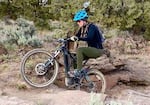The likely future of riding electric bikes on popular trails in central Oregon was laid out in a draft plan by Deschutes National Forest officials Tuesday.
The U.S. Forest Service is accepting public comments through July 31 about its proposal to allow class 1 e-bikes on 67 existing trails near Bend, Sisters and Sunriver. Class 1 means there’s no throttle on the bike, and riders must pedal for assistance, with speeds topping out at 20 mph.
Currently, all types of e-bikes are only allowed on roads or trails designated for motorized vehicles in the Deschutes National Forest. Those rules could soon change to include class 1 e-bikes in popular mountain biking areas like Peterson Ridge, Phil’s Trail, Sunriver, and Wanoga.
The Forest Service said in a statement this week the draft rules are intended to prevent conflicts between people using public lands in different ways and to create more equitable access. Critics of e-bikes on trails have said they are too powerful and cause more crowding and damage to strained public lands, while others question how the rules will be enforced.

Dacia Kailin rides her mom's class 1 e-bike in an undated photo taken east of Bend.
Courtesy of Dacia Kailin
The debate has gotten so heated on social media that in the private BendTrails Facebook group, which has nearly 10,000 members, moderators banned all arguments about e-bikes.
For Dacia Kailin, allowing more e-bike access to the forest would be life-changing.
“It would mean I can ride a bike with my husband and with my friends,” said the 28-year-old Bend resident.
Kailin was diagnosed with a genetic cardiac condition when she was 19. She said she learned of her condition only after her uncle died from it while he was mountain biking in Corvallis.
Kailin went from being an avid runner and soccer player, to having to carefully consider her physical activities. Then about five years ago, her parents got e-bikes and loaned her one.
“I was like, ‘Wow, this is great. This is an awesome opportunity for people of all ages and ability levels to be able to participate in an activity that maybe they never did,’” she said.
Kailin hasn’t bought her own e-bike yet because of the limitations on where she can legally ride one in the forests near Bend, she said.
Longtime Bend mountain biker Don Leet has been riding those trails for decades, and he’s very opposed to the rule changes.
“I’m 73 years old and I’ve spent 40 years building and promoting mountain bike trails. The whole premise is that they are for non-motorized use,” he said.
To Leet, even class 1 e-bikes are too powerful and too fast to safely share trails with mountain bikers.
“Obviously not everyone who owns one is rude,” Leet said, “But a lot of them are.”
He compared the current conflict over e-bikes to another public lands fight from 60 years ago, when the 1964 Wilderness Act prohibited motorized vehicles in wilderness areas, despite arguments that would limit access.
“Fortunately, we won that battle,” Leet said.
Another fixture in Bend’s mountain biking scene, Kevin Hopper, said he supports allowing class 1 e-bikes on trails, but understands why some people fear the rule changes.
“One of the greatest fears people have is that e-bikes will bring a lot of people to a sport that otherwise wouldn’t do it. And anytime you have rapid growth to something, not everyone gets educated,” he said.
But for Hopper, “Etiquette is etiquette.”
“Overuse and abuse quite often comes down to education,” he said.
Deschutes National Forest spokesperson Kaitlyn Webb said in a statement that the agency plans to rely on “education about regulations and etiquette, along with engineering [and] effective planning.”
“Most trail users strive to follow the rules,” Webb said. “This project would reduce confusion around e-bikes and provide legal opportunities that match the desired experience which should minimize enforcement needs.”
The Forest Service’s proposed e-bike rules could take effect in Deschutes National Forest next April.



